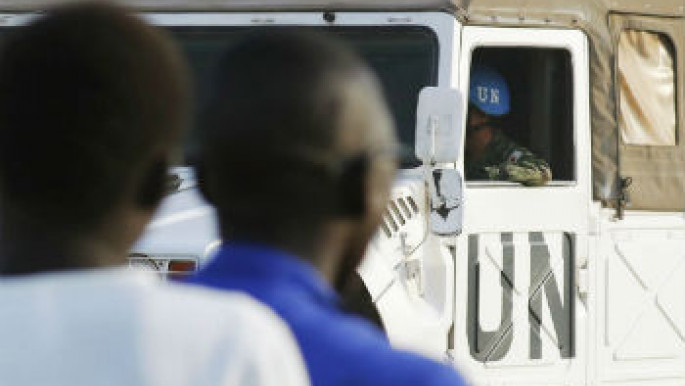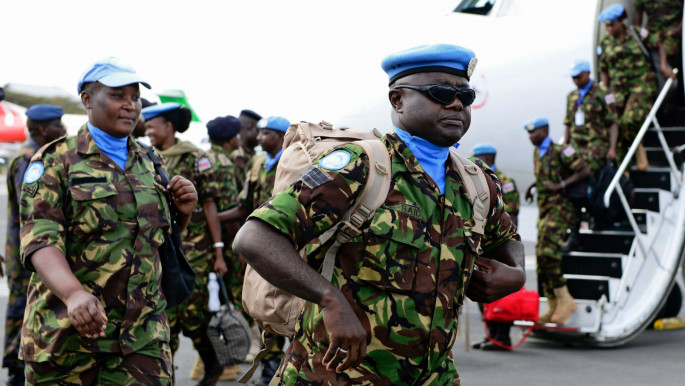Could an arms embargo prevent genocide in South Sudan?
On October 8, a group of gunmen stormed in front of a convoy of three buses near Lainya, South Sudan, and opened fired on the seated passengers.
According to official government reports, 21 people were killed in the atrocity, but rumours quickly spread through the country that 200 people had been brutally wiped out - all from the one tribe.
"About 200 Dinka people, mostly women, children and elderly who were travelling from Yei to Juba were massacred in cold blood - simply because they were Dinka members," reported one tribal union.
Reports of a similar nature are now springing up almost every day across the country, as a UN commission to the world's newest country warns of a society collapsing along tribal lines.
"Many of the warning signals of impending genocide are already there," said Yasmin Sooka, chairperson of the UN commission.
"There is already a steady process of ethnic cleansing underway in several areas of South Sudan using starvation, gang rape and the burning of villages."
Yet despite these warnings and the estimated deaths of more than 50,000 civilians, the international community cannot seem to agree on an appropriate response.
And as a direct result of this failure to act at any point over a period of more than three years, the UN commission now warns that the world may witness a new genocide - possibly even a catastrophe comparable to the 1994 Rwanda disaster.
"The scale of rape of women and girls perpetrated by all armed groups in South Sudan is utterly unacceptable and is frankly mind-boggling," said Sooka.
"Aid workers describe gang rape as so prevalent that it's become 'normal' in this warped environment."
The civil war
South Sudan was officially founded in 2013 after it voted to secede from Sudan. Within months, however, President Salva Kiir, a Dinka, accused Vice-President Machar Riek, a Nuer, of attempting a coup against him - and armed conflict broke out once again.
Rebel troops, known as the Sudan People's Liberation Army in Opposition (SPLA/IO), are majority Nuer and they back Machar as the new leader of South Sudan.
The SPLA/IO rebels are fighting against government forces, known as the Sudan People's Liberation Army (SPLA), which is Dinka-majority.
The causes of this conflict lie long in the past, but they are rooted firmly in ethnic divisions.
Nuers and Dinkas were once allied together in a fight for independence from Khartoum. All this changed in 1991, when Machar made a leadership split with John Garang - a Dinka.
 |
They don't recognise the [Dinka] government in power - Luuk van de Vondervoort, former UN arms expert |
 |
Following this split, Nuer fighters, led by Machar, started to attack Dinka villages and thousands of civilians were killed. It is thought that this attack sowed the seeds of conflict between the two tribes and allowed for today's atrocities to occur.
 |
|
| Japanese soldiers are among the international troops deployed to South Sudan [AFP] |
"The reason you have such a deep problem today is that the government don't have the support of the Nuer," said Luuk van de Vondervoort, the UN's arms expert for South Sudan until 2015.
"There's been so many atrocities committed on both sides for so long - and people remember those crimes.
"The South Sudanese have long memories and the Nuer regard the act of joining the government to be treason.
"They don't recognise the [Dinka] government in power."
An 'economic' embargo
The US government has recently been lobbying for an arms embargo at the UN Security Council. This order would also place a travel ban and asset freeze on Riek Machar, South Sudan army chief Paul Malong and information minister Michael Makuei.
Many experts believe that such an embargo, when used in conjunction with other measures, is important, as it shows Juba that the international community is paying attention.
"We need to send a message that we've had enough patience with the government of South Sudan," said Frank Slijper, a policy adviser for PAX, an NGO.
"We have to keep negotiating, that all has to continue - but it's now high time to stop the supply of arms into the country."
Most of South Sudan's weapons arrive through legitimate sales from China, Israel, Russia and Ukraine. Ukraine is one of the biggest exporters to Juba, having sold tanks, helicopters and aircraft to a government which openly uses violence against its citizens.
An arms embargo would prevent these deals from happening, choking off at least the legal supply of arms - and experts believe this would have more than one positive effect.
A recent Sentry report alleged that revenues collected through arms sales were being laundered through Kenyan banks, directly bankrolling the military leaders that were propagating the civil war - to the tune of millions of dollars.
Cutting off this supply of arms, the report argued, would remove a lucrative form of income to the warlords, ultimately creating an economic incentive for peace.
'Heart-breaking'
This idea of a restriction on the sale of weapons in South Sudan is not new. The EU previously set up sanctions in July 2014, saying it was "determined to do everything possible to avert further suffering".
Why then, as a natural consequence to more than 50,000 deaths, has the UN not followed suit?
"It's heart-breaking," said Vondervoort.
"The UN's adviser on genocide says there's a significant risk and all this has led to is bickering - that's not a proportional response."
 |
What kind of leadership is it that resorts to deadly weapons and identity politics, time and again? Failed leadership - Ban Ki-moon, UN Secretary-General |
 |
Behind the scenes in South Sudan's NGO community, there are a number of activists who have spoken with The New Arab of a culture of racism.
These activists have told of a growing and entrenched belief among some international parties that fighting between communities, particularly that involving murder and rape, is an innate part of South Sudanese culture.
 |
|
| Kenya withdrew its troops from UNMISS in protest [AFP] |
And this sense of ignorance seems to be linked to a lack of interest in trying to stop a genocide.
Peace agreement
President Kiir signed a peace agreement with rebels in August 2015, following almost 20 months of fighting and the deaths of thousands of civilians. The deal broke down in July of this year, following renewed fighting across the country.
Speaking in response to the breakout of violence, UN Secretary-General Ban Ki-moon called for an arms embargo.
"What kind of leadership is it that resorts to deadly weapons and identity politics, time and again? Failed leadership," Ban said.
Since July, most international partners have recognised that the peace agreement is now dead and buried. Most partners, it would appear, except the Joint Monitoring and Evaluation Commission (JMEC), which was set up to "oversee all aspects of the implementation of the agreement".
Richard Bailey, a spokesperson for JMEC, said he could not comment on the UN commission's warning of an impending genocide but reaffirmed his organisation's commitment to peace.
"The agreement remains in existence and it remains the only current vehicle to drive a peace process," Bailey told The New Arab.
"We continue with our work on the basis that this agreement remains the only opportunity we have for constructing a sensible peace settlement.
"We have acknowledged over the past months the challenges, the wide ranging breaking of the ceasefire, but we continue to appeal to all parties to engage with the process."
Yet, despite the JMEC's optimism for the future of an internationally brokered deal, many other stake-holders are now looking to pursue other means for peace.
Peace-keeping
UNMISS, the UN's peace-keeping mission in South Sudan, is looking to boost its presence in the region through a "regional protection force", adding more than 4,000 troops to their existing deployment. It's believed that this force would be used to enforce any embargo, should it be agreed.
Plans to introduce a protective force have been stalled for months, however.
Kenya had originally promised a large number of soldiers, but withdrew their 1,000 troops from UNMISS in protest against the dismissal of a Kenyan general. This dismissal came in light of an independent report criticising the general's lack of a response to an attack on the UN compound in Juba.
 |
One female NGO worker reported being raped at gun-point by fifteen separate soldiers |  |
On July 11, South Sudanese soldiers launched a four-hour assault against NGO and UN staff at the UN House, near the UNMISS headquarters. One female NGO worker reported being raped at gun-point by fifteen separate soldiers. A journalist was killed during the onslaught.
UNMISS soldiers failed to respond to the UN's frequent calls for help.
In response to the report's findings, the Kenyan government said that Lieutenant General Ondieki had only been in his role for fewer than 100 days and had not received a proper hand-over briefing.
Following on from this "diplomatic storm" - in the words of one review - there has been some recent movement on a regional protection force, which would bolster the already mobilised 12,000 UNMISS troops.
"The South Sudan government announced that they are in agreement with the introduction of a regional protection force," said Chantal Persaud, a spokesperson for UNMISS.
"The next step is to agree on logistics at the troop-contributing level and for land to be attributed from the government."
There is no current timeline as to when any additional troops or other military assets might arrive.
Politicking
Despite urgent calls for action, the international community has continued to drag its heels in finding a coherent response to a major threat of extreme violence.
Although the US is not understood to currently be looking to pursue an arms embargo, following its recent Security Council rebuttal, it remains a possibility.
"There's been nearly three years of war now, agreements have been violated time and again and still there's no real sight of a solution," said Slijper, policy adviser at PAX.
"We need an embargo and we need to enforce that embargo - it's long overdue."
Follow Rob Cusack on Twitter: @rob_cusack





 Follow the Middle East's top stories in English at The New Arab on Google News
Follow the Middle East's top stories in English at The New Arab on Google News


